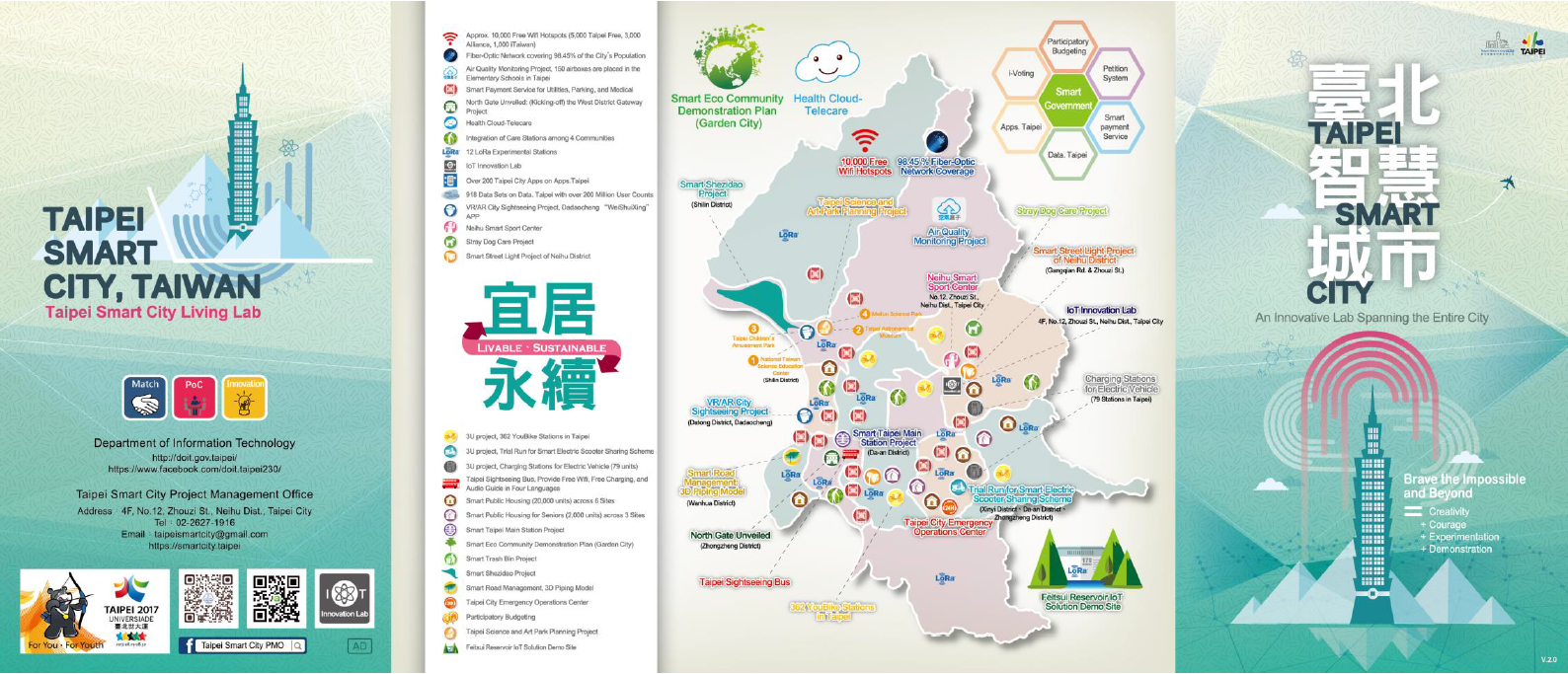
Taipei Smart City Living Lab
- WEGO |
- Smart Sustainable City Projects Catalog
Taipei
To establish communication with this city regarding their project, please contact secretariat@we-gov.org
-
Fast Facts
City :
66
Smart City Projects
600
Match-making Meetings
200
Companies Interviewed
Region : Asia
National GDP Per Capita (USD) : 24,971 (IMF, 2018)
City Population: 2.674 Million
Year Implemented : 2016
National Gini Index : 33.8 (CIA, 2012)
Tags : CITIZEN PARTICIPATION
Technologies Utilized : Website, Smart platform
Funding Source : Government
Project Cost :
Project Savings :
Planned Project Duration : Ongoing
KPIs : Number of PPP projects implemented, Number of citizen suggestions
-
Project Context and Overview
Public-Private Partnerships (PPP) offer great potential for cities to undertake successful smart city projects. However, these arrangements can be hampered by excessive and strict regulations on interactions between the public and private sector. The Department of Information Technology (DOIT) established the Taipei Smart City Project Management Office (PMO) to address this issue. Together, they created a platform and framework to facilitate partnerships between government offices and private companies.
DOIT and PMO regularly conduct research to determine the needs of the Taipei government and its citizens. They use this information to match public and private entities that would produce products and services that would cater to these needs. Government offices can also submit requests for specific projects they wish to carry out. The projects developed under DOIT and PMO are tested in Taipei, essentially transforming the city into one big living lab.
In 2016, DOIT and PMO have developed 66 smart city projects, interviewed around 200 companies, hosted nearly 600 public-private matchmaking meetings, and collaborated with 17 bureaus in the city government. -
Project Planning and Implementation
The Taipei government and its citizens have multiple needs and demands, and the private sector’s technologies and innovations are abundant. DOT and PMO were tasked with determining what kind of demands should be addressed first and what solutions would be more suitable to address them. They conduct research and pilot projects with their partners in order to make sure the projects are feasible and that they will meet the needs and expectations of the public.
From the perspective of the government, the budget should be invested in mature projects that have a higher possibility for success. Therefore, DOIT and PMO also carry out careful budgeting and procurement procedures. They also support their partners by carrying out field trials to attract even more private investment, government grants, or subsidies.
PMO is fully funded by the government. The budget allocates 80% on human resources, 15% on hardware and software purchase and development, and 5% on miscellaneous expenditure.
Given that most projects developed under DOIT and PMO are quite innovative, their application may conflict with current regulations. In such cases, DOIT, PMO, and the partners involved ask for assistance from the central government for conducive legal interpretation or for revision of relevant regulations. -
Project Results
The DOIT and PMO Public-Private-Partnership platform serves a number of functions. It serves as the government’s smart city professional think tank by sharing smart city best practices and professional advice with Taipei City’s government agencies and transforms Taipei into a test field for innovative products and services produced by public-private partnerships. It also promotes smart city practices domestically and internationally by promoting their projects in both domestic and international smart city-related exhibitions and activities. PMO has established a network with 18 cities including New York and Kansas (USA), Greenwich and Peterborough (UK), Fukuoka (Japan), and Selangor (Malaysia).
The Taipei Smart City Living Lab project has over 60 successful matchmaking cases. Some of them include:
- Collaboration with the Department of Cultural Affairs that uses augmented reality (AR) or virtual reality (VR) videos to introduce tourists to Dadaocheng, a historically and culturally-rich neighborhood in Taipei;
- Collaboration with the Taipei City Fire Department to use an unmanned aerial vehicle (UAV or drone) as a communication transmission station in case of a disaster if the main station is inoperative;
- DOIT and PMO also oversaw the partnership among the Department of Economic Development, Gemtek, Dell, Asia Pacific Telecom, and SigFox to build the Taipei IoT Innovation Lab to accelerate the development of smart services;
- Collaboration with Gemtek to develop IoT Experimental Platform, an online portal that allows anyone to research and develop LoRa technology.
DOIT and PMO also set up the Taipei Smart City website to showcase their projects and to share smart city best practices. The website also allows citizens to make suggestions and submit project proposals. -
Recommendations for Transfer
The Taipei Smart City Living Lab project is a more comprehensive alternative to the traditional way of coordinating public-private partnerships. The public-private partnership scheme is a well-known strategy applied by all governments, but Taipei has amplified this concept and combined it with citizen engagement. Currently, this is the only project of its kind in Taiwan, but it hopes to mature enough to be easily transferable to other cities.
The Smart Living Lab project required the creation of a new government office, coordination among several government offices, and large financial support from the central government. Given the magnitude of this project, it may not be easily transferable to other cities. However, cities may be able to adopt certain aspects of this project, such as setting up a website to share smart city best practices and to allow citizens and government offices to express their needs and opinions. Additionally, cities may want to adopt products or services developed by PPPs under the Smart Living Lab project. -
Figures and Images


-
External links

